- Home
- Lois Lowry
The One Hundredth Thing About Caroline Page 2
The One Hundredth Thing About Caroline Read online
Page 2
Mrs. Kokolis smiled and kept on knitting. She was such a good knitter that she could talk and make complicated sweaters at the same time.
"Not yet," she said. "Soon, though."
Mr. and Mrs. Kokolis used to own the Greek restaurant across the street. They had come to the United States from Greece thirty years ago and had been saving, ever since their children grew up, to go back to Greece for a visit. Then Mr. Kokolis had died one day, very suddenly. He had been making stuffed grape leaves—his specialty—when he looked up, Mrs. Kokolis had told Caroline, and said, "Well. My goodness." Then he fell over and was dead, of a heart attack.
So Mrs. Kokolis was going to go back to Greece all alone. At least she said she was. But she never quite got around to doing it. She kept canceling her airline reservations.
"Soon, though," she kept saying.
"In June," she said, today. "June for certain."
Caroline smiled at Mrs. Kokolis. She watched a man putting his clothes into a drier. She giggled to herself. An Apatosaurus, she thought. He looks like an Apatosaurus.
It was true. He wasn't as large as an Apatosaurus, of course, because a real Apatosaurus would have filled two Laundromats and still had to stick its head out through a window.
But he was very tall, with a long neck and a nose that looked too high on his face. He had buck teeth and a stupid look.
Caroline giggled again, remembering something. The Apatosaurus had two brains, both very small; so he wasn't at all smart. But his second brain was located in his bottom, right where his tail began.
The man putting his clothes into the drier didn't have a tail, of course. And Caroline was fairly certain that he didn't have a second brain in his behind. But he sure looked like an Apatosaurus.
It was surprising, the number of people who resembled dinosaurs.
No one else was in the laundry this morning except for a couple of teen-age girls reading magazines. Caroline checked to make sure that her laundry was going around in the washers. Then she sat down and took Frederick Fiske's mail out of her pocket.
She felt a little guilty, beginning to read it. But it was open, after all, and it had been in the wastebasket.
Anyway, investigators had to use any method possible to find out stuff. Stacy had reminded her of that often.
The first letter was simply boring. It was a note from the public library, reminding him politely that a book he'd checked out, Forensic Toxicology, was a month overdue. Caroline didn't know what "forensic toxicology" meant; it didn't sound very interesting. She stuffed that letter back into her pocket.
Then she read the second letter, and her head began to whirl, the way her laundry was whirling now in the washing machine.
Fred, [the letter began]:
The woman's terrific. But the kids, frankly, seem more and more of a problem. Eliminate the kids. You can figure out a way.
Call me, and we'll have lunch and talk it over.
Carl
That was all. Caroline turned the envelope over and looked at the return address. Carl Broderick was the man's name, and he lived on East 52nd Street.
Why would a man on East 52nd Street be telling Frederick Fiske to murder some children?
3
Caroline dialed Stacy's number as soon as the laundry was folded and put away.
"Guess what, Stace?" she said.
"You guess what," said Stacy Baurichter. "Harrison Ledyard is having an affair."
"How do you know?"
"I looked through his trash. It was down in the basement of our building, because the superintendent hadn't put it outside yet. And there were cigarette butts with lipstick on them, and—"
"Stacy. Maybe his mother came to visit. Maybe his mother smokes. Or his sister. Or his cleaning lady. You have to verify your evidence, Stacy."
"That's not all. Wait'll you hear." Stacy paused ominously. "There was something else. A bra."
"In his trash?"
"Ripped."
"A ripped bra?"
"Torn in a passionate frenzy. Honest. Now don't try to make me believe that was his mother!"
"No," said Caroline, "I guess not. Was it black lace?"
"Pink. No lace, but some embroidery. Thirty-four B."
"That's not very big," said Caroline. "I think for a passionate frenzy you really need a thirty-eight D at least."
But Stacy assumed her investigative reporter's voice. "Research indicates that ever since Brooke Shields became so popular, small boobs are in."
"Stacy, in is one thing. Passionate frenzy is something else."
"Well. Anyway. It's the first interesting thing I've found out about Harrison Ledyard in all these months. Can you imagine? He looks so quiet and intellectual and Pulitzer Prize-winning. And now it turns out that in his spare time he's grabbing and ripping and tearing the clothes off of innocent women. I made a lot of notes. The bra's a Maidenform. And the lipstick is Misty Coral, I think. The cigarettes are Benson and Hedges menthol."
"Stacy, for a minute I almost forgot what I wanted to tell you. It's even better than Harrison Ledyard's sex life."
"What could be better than that?"
Caroline looked around to be certain no one could overhear her. She had taken the telephone into the bathroom, but the door wouldn't close tight over the cord. J.P. was in his bedroom, probably working on an electrical project. Her mother was washing the kitchen floor, and the radio was on in the kitchen. She eased the door closed again as far as it would go and spoke in a low voice.
"Frederick Fiske," she whispered into the telephone.
"The guy upstairs? He's having an affair, too?"
"Yes. But worse than that."
"BAURICHTER DEMANDS DETAILS," said Stacy. When she was excited about something, she often spoke in headlines. It was part of her journalistic training.
"He's a murderer," announced Caroline.
"A what? How do you know? Did you find body parts in his trash?"
"The murder hasn't taken place yet," Caroline explained. "But I found a letter. He's going to commit a murder. And guess what kind?"
"Ax?"
"No, it doesn't say the method. But it's going to be a child murder. A children murder, actually. The letter said, 'Eliminate the kids.'"
"Save it for fingerprints," ordered Stacy, "PRINTS OFTEN PROVE CASE," she added, in a headline.
"Too late," said Caroline. "I picked it up in my bare hands already. Anyway, it doesn't matter. I know who wrote it, and I know who it was to."
"Well, save it for evidence. And take notes. Listen: this is important, Caroline. Do friends describe him as a loner?"
"What?"
"In the newspapers," Stacy explained, "after they catch a psychopathic killer, it always says, 'Friends described him as a loner.' Do Frederick Fiske's friends describe him as a loner?"
"Stacy," Caroline pointed out impatiently, "I don't even know if he has any friends. He's always by himself."
"That proves it, then."
"Proves what?"
"He's a loner," said Stacy.
"Stace," Caroline whispered suddenly, "I have to go. My mother's coming.
"See you at school Monday," she said cheerfully, and loudly, into the phone as her mother passed in the hallway. "Bye, Stacy."
J.P. came out of his bedroom. "Bye, Stacy," he imitated, in a high, girlish voice. His own voice was beginning to deepen.
"Creep," said Caroline to her brother.
"Guess what I'm building in my room," said J.P.
"Couldn't care less."
"An electrifier," he announced happily. "Sometime, when you least expect it, when you're sound asleep, I'm going to sneak into your bedroom and—"
"MOM!" yelled Caroline.
Her mother sighed. She had curled up on the living room couch with a magazine. "He's only kidding, Caroline," she said. "James, stop teasing your sister."
"Zap," said J.P. meaningfully, looking sinister.
"Go zap yourself, Beastly," said Caroline with disdain. She wen
t into her room and closed the door.
In her bedroom, Caroline knelt on her freshly made bed (Saturday was the only day that she didn't have to make her own bed; her mother changed the sheets on Saturday), reached up to the bookcase attached to the wall, and took down a dictionary. She rarely used her dictionary. It was wedged in so tightly that when she removed it, three mystery books and a fat volume about the Paleolithic Age came crashing down, bounced on her blue bedspread, and fell to the floor. Caroline glanced at them, shrugged, and left them there. Sometimes, in the house-decorating magazines that her mother liked to read, there were books scattered on the floor of a room. It gave a room a casual, intellectual look. Caroline decided that her room could have a casual, intellectual look until next Saturday, when it was cleaning day again.
She took Frederick Fiske's mail out of her pocket. The letter from Carl Broderick didn't require a dictionary. It was quite clear: a clear command to "eliminate the kids." No words to look up there. "Eliminate the kids" meant murder them, and you didn't need a dictionary to figure that out.
It was the other letter that was more puzzling. She had simply brushed it aside when she'd read it the first time. A notice from the library about an overdue book. Caroline got notices like that all the time. Once she had kept a book on vertebrate paleontology so long that the fine was $2.50; she had had to use some of her grandmother's birthday check to pay off that fine. She could almost have bought a book about vertebrate paleontology for that amount.
But now she looked carefully at Frederick Fiske's notice from the library. She realized that if the police ever examined the library records for Caroline MacKenzie Tate, they would be able to figure out quite a bit about her. They would find a few teen-age romances and one or two books about good grooming that she had checked out last year, when she had begun to be interested in a boy at school and thought that maybe if she changed her hair style and maybe used eye make-up he would notice her. He hadn't. She had tried three different hair styles with no effect at all on the boy. And her mother had said no, absolutely not, not until you are much older, to the eye make-up.
The police might also think that she was briefly interested in breeding cocker spaniels or something, but that would be a mistake. It had to do with the eye make-up and hair styles. She had taken out a book called Grooming a Dog by mistake.
But mostly they would find that she had checked out books about prehistoric eras, extinct mammals, fossils, reptiles, and paleontology. They would be able to figure out from them that Caroline was more interested in being a paleontologist than she was in eye make-up or in raising champion dogs.
So it was definitely one way to figure out what Frederick Fiske was interested in. She looked at the letter from the library again. The overdue book was called Forensic Toxicology. She didn't know what either word meant.
"Forensic" meant, she found from the dictionary, "pertaining to legal proceedings."
Well. That was interesting. If Frederick Fiske intended to start murdering children, there were certainly going to be legal proceedings.
Actually, Caroline thought, she really had to give him credit. It was pretty clever to read a book about legal proceedings before he murdered anyone.
She checked the library letter again and searched through the dictionary for the second word, "Toxicology." When she found it, her eyes widened. She read the definition twice to be sure it said what she thought it said.
"Toxicology (tok'si-kol'o-ji) n. (toxic + logy). (See TOXIC.) The science of poisons."
It was horrible. Horrible horrible horrible. It made Caroline think vaguely of eggplant. She shuddered, and put the dictionary away.
It confirmed what she had already known, down deep. "Eliminate the kids" could, conceivably, have meant, Send them off to live with their father in Des Moines. Every now and then, Caroline's mother threatened to do just that, usually when Caroline and J.P. had been fighting a lot. Once, at the end of a long rainy Sunday, when Caroline and J.P. had been at war all day, they ran through the apartment throwing ice cubes at each other. The whole fight had started over ice cubes. Caroline had poured herself a ginger ale that morning, and she had said to her brother sarcastically, "It sure is nice to find ice cubes in the refrigerator occasionally," because usually he never refilled the ice trays.
J.P. had just looked at her in a fake friendly sort of way while she drank half the glass of ginger ale. Then he had said, casually, "I spit in the trays before I put them in the freezer."
By the end of the day, their fight had escalated into major warfare, with ice cubes as weapons. Finally their mother had thrown down the book she was reading and shouted, "That's it? If you two don't stop it this instant, I am sending you both to Des Moines to live with your father!"
It was the sort of thing parents said once in a while. But Frederick Fiske wasn't a parent. He lived alone on the fifth floor. No children ever came to visit, Caroline was quite sure.
And the library book cinched it. An angry parent might be tempted to send a bratty child to Des Moines, but an angry parent would never start studying up on the science of poisons. Eggplant, maybe. Not poisons.
Only a murderer would do that.
4
"What is all this secret telephoning?" asked Mrs. Tate. "You're not in any kind of trouble, are you, Caroline?"
"No," said Caroline casually. "I'm just calling Stacy about an assignment."
That wasn't a lie. She took the telephone into the bathroom, closed the door as far as she could over the cord, and said loudly, when Stacy answered, "Hi, Stace. I'm calling you about an assignment."
Then she lowered her voice. "Listen, Stace, it's not a school assignment. I just wanted my mother to think that it was. It's a detective assignment."
"About the murderer?" Stacy was whispering, too, although she didn't need to. Stacy had her very own private telephone, in her bedroom. It was yellow, to match the decorator bedspreads and curtains. There were some really good things about being rich.
"Yeah. Can you go out this afternoon? It's not very far."
"Sure. I'll just tell my mother I'm going to the art museum. She always thinks it's terrific that I go to the art museum all the time."
"I didn't know you did."
"I don't. Half the time I'm down in the basement going through the trash. But I can't tell my mother that."
"Well, listen. I want you to go to East Fifty-second Street. That's not far, is it?"
"Nope. I can get the bus at the corner and be there in twenty minutes. Or I can jog and be there in ten."
"Whichever. Anyway, it's important." Caroline took Carl Broderick's letter out of her pocket and read the name and address to Stacy. "Just check it out, would you? He's an accomplice. He may be the mastermind, in fact."
"What should I look for?"
"I don't know," Caroline whispered. "Just see what's at that address. Probably it won't be a Poisoning Center, or anything. But there might be clues. Look for clues."
"Gotcha. I'll call you back in, say, an hour or so."
"Right."
"Caroline," Stacy said ominously before she hung up, "if no one ever hears from me again, give that address to the police, would you? They'll find my body there."
"Right. But don't take any dangerous chances, Stacy."
"I won't. But if after, oh, three days, say, I don't return—"
"I will, Stacy. I promise. But be careful. Remember, it's children they're after."
"I'll wear lipstick," said Stacy. "I got some Crimson Shadows lipstick at the drugstore, just for assignments like this."
"Stacy's calling back in about an hour," said Caroline when she went to the kitchen for lunch. "She's doing some research for an assignment we have together."
"Fine," said her mother cheerfully. "Want a pickle with your sandwich?"
Caroline and J.P. each took a dill pickle.
"The phone may not be working in an hour," announced Caroline's brother. "I'm going to do some experiments on it after lunch."
&nbs
p; "Don't. Touch. That. Phone," said Caroline angrily, with a mouth full of bologna sandwich.
"She's absolutely right, James," said Mrs. Tate. "The phone company said they were going to charge for the repairs next time you experimented with the telephone."
"Well," said J.P., chewing, "can I borrow your radio then? I need to experiment with something."
His mother sighed. "All right. You can use my radio. But don't wreck the alarm, okay? I can't be late to work Monday. I was late twice last week, once because you ruined my toothbrush, James—"
"I had to clean the gunk out of my motor with something," J.P. explained.
"—and once because I couldn't find my pocketbook."
Caroline sighed. "I already said I was sorry, Mom. I was examining the alligator skin under a magnifying glass, and somehow it ended up under a whole pile of stuff on my desk."
"It isn't alligator, anyway. It's plastic. That pocketbook only cost fourteen dollars. If I lose my job because I'm late one more time, I won't even be able to afford a plastic pocketbook. I'll have to become a bag lady."
"I'll support you in your old age, Mom," said Caroline. "After I'm a paleontologist, I'll send you a check every month, from Asia Minor or wherever I am."
"Me too," said J.P. "When I'm an electrical engineer, I'll be really rich."
"Maybe by then I will have married a millionaire," said their mother. "In the meantime, do either of you want another sandwich, bearing in mind that this bologna cost $1.89 a pound?"
"Me," said J.P.
"Pig," said Caroline sweetly, and ducked just in time to evade the dill pickle that her brother threw her.
"Sometimes," sighed their mother, "I wish that I had remained childless."
Back in her room, waiting for Stacy to call, Caroline curled up on her bed with her stuffed Stegosaurus. She began to think about dinosaurs in general, and about the particular contribution that she would make to science after she was a qualified paleontologist.
Caroline had begun to develop the Tate Theory of Evolution. According to her theory, certain people alive in the twentieth century had not actually evolved very much from prehistoric times. Of course, they were disguised as civilized people, because they wore clothes and held jobs and went to school and did all the things that civilized people are supposed to do.

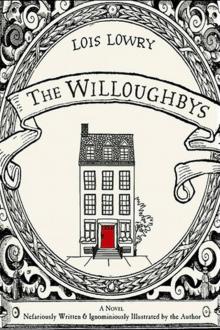 The Willoughbys
The Willoughbys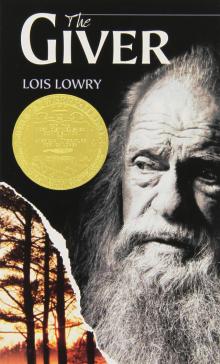 The Giver
The Giver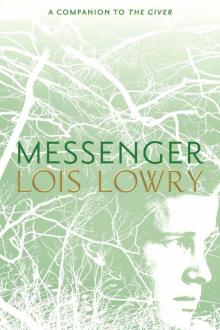 Messenger
Messenger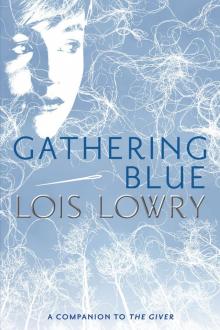 Gathering Blue
Gathering Blue Gooney Bird and All Her Charms
Gooney Bird and All Her Charms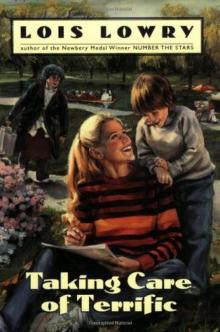 Taking Care of Terrific
Taking Care of Terrific Gooney Bird on the Map
Gooney Bird on the Map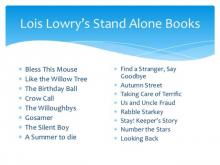 The Birthday Ball
The Birthday Ball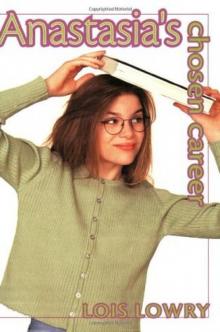 Anastasia's Chosen Career
Anastasia's Chosen Career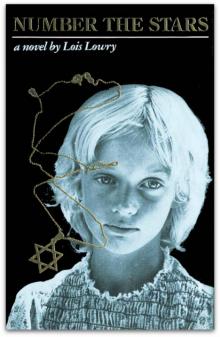 Number the Stars
Number the Stars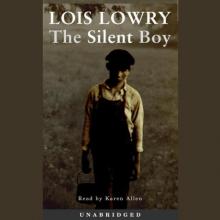 The Silent Boy
The Silent Boy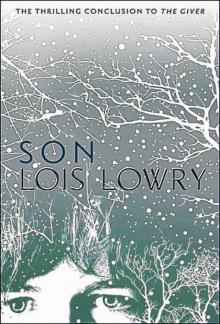 Son
Son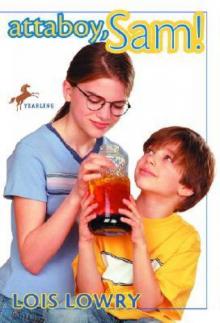 Attaboy, Sam!
Attaboy, Sam! Gooney Bird Greene
Gooney Bird Greene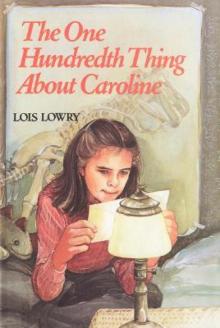 The One Hundredth Thing About Caroline
The One Hundredth Thing About Caroline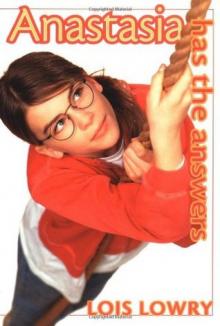 Anastasia Has the Answers
Anastasia Has the Answers Your Move, J. P.!
Your Move, J. P.!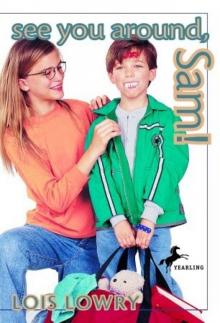 See You Around, Sam!
See You Around, Sam!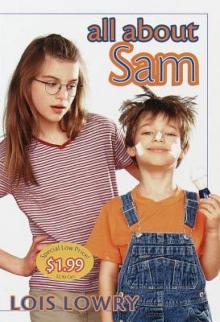 All About Sam
All About Sam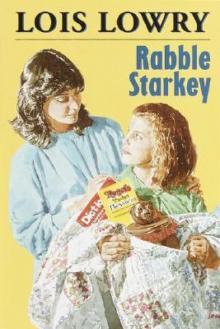 Rabble Starkey
Rabble Starkey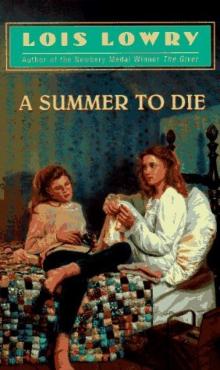 A Summer to Die
A Summer to Die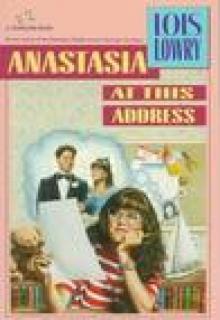 Anastasia at This Address
Anastasia at This Address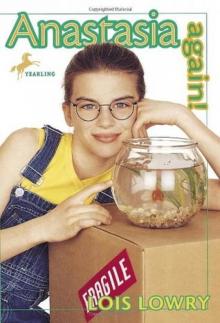 Anastasia Again!
Anastasia Again!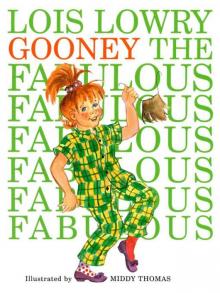 Gooney the Fabulous
Gooney the Fabulous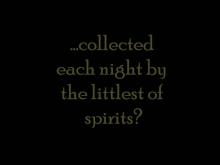 Gossamer
Gossamer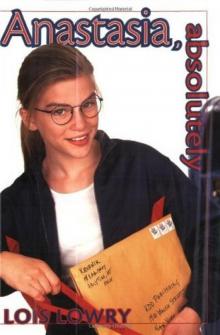 Anastasia, Absolutely
Anastasia, Absolutely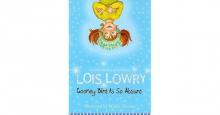 Gooney Bird Is So Absurd
Gooney Bird Is So Absurd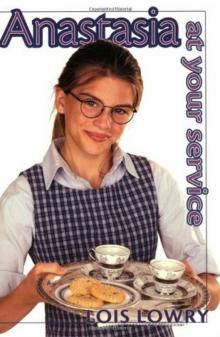 Anastasia at Your Service
Anastasia at Your Service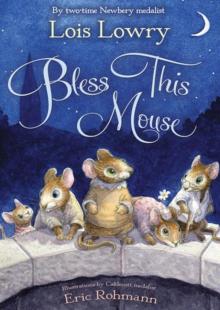 Bless this Mouse
Bless this Mouse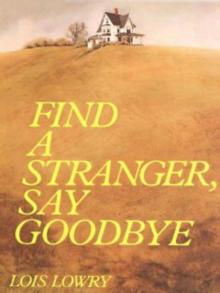 Find a Stranger, Say Goodbye
Find a Stranger, Say Goodbye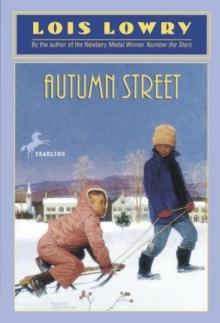 Autumn Street
Autumn Street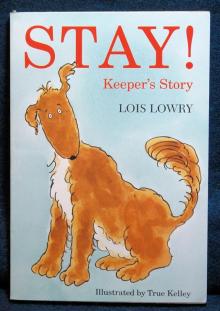 Stay Keepers Story
Stay Keepers Story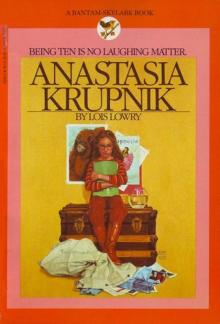 Anastasia Krupnik
Anastasia Krupnik Zooman Sam
Zooman Sam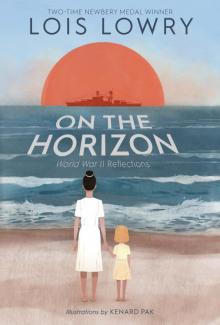 On the Horizon
On the Horizon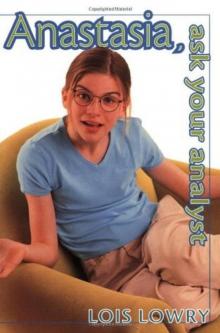 Anastasia, Ask Your Analyst
Anastasia, Ask Your Analyst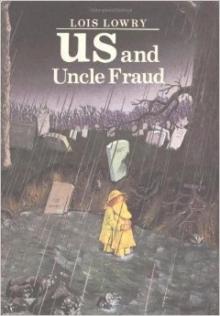 Us and Uncle Fraud
Us and Uncle Fraud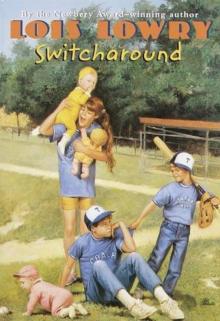 Switcharound
Switcharound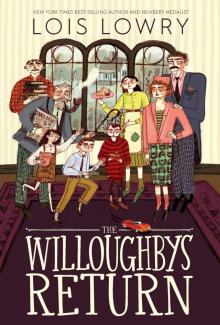 The Willoughbys Return
The Willoughbys Return Dear America: Like the Willow Tree
Dear America: Like the Willow Tree Shining On
Shining On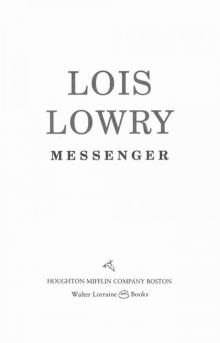 Messenger (The Giver Trilogy)
Messenger (The Giver Trilogy)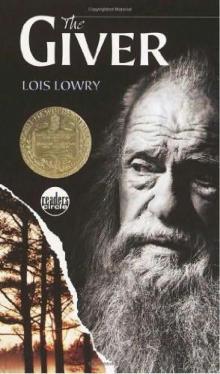 Giver Trilogy 01 - The Giver
Giver Trilogy 01 - The Giver